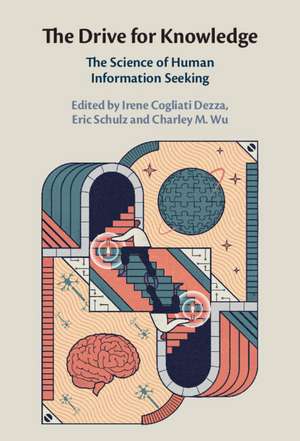The Drive for Knowledge: The Science of Human Information Seeking
Editat de Irene Cogliati Dezza, Eric Schulz, Charley M. Wuen Limba Engleză Hardback – iun 2022
| Toate formatele și edițiile | Preț | Express |
|---|---|---|
| Paperback (1) | 185.26 lei 6-8 săpt. | |
| Cambridge University Press – 25 oct 2023 | 185.26 lei 6-8 săpt. | |
| Hardback (1) | 640.98 lei 6-8 săpt. | |
| Cambridge University Press – iun 2022 | 640.98 lei 6-8 săpt. |
Preț: 640.98 lei
Preț vechi: 720.21 lei
-11% Nou
Puncte Express: 961
Preț estimativ în valută:
122.67€ • 126.72$ • 102.09£
122.67€ • 126.72$ • 102.09£
Carte tipărită la comandă
Livrare economică 26 martie-09 aprilie
Preluare comenzi: 021 569.72.76
Specificații
ISBN-13: 9781316515907
ISBN-10: 1316515907
Pagini: 300
Dimensiuni: 158 x 235 x 23 mm
Greutate: 0.59 kg
Ediția:Nouă
Editura: Cambridge University Press
Colecția Cambridge University Press
Locul publicării:New York, United States
ISBN-10: 1316515907
Pagini: 300
Dimensiuni: 158 x 235 x 23 mm
Greutate: 0.59 kg
Ediția:Nouă
Editura: Cambridge University Press
Colecția Cambridge University Press
Locul publicării:New York, United States
Cuprins
Preface Cogliati Dezza ,Schulz and Wu, Part I. What Drives Humans to Seek Information?: 1. The motivational processes of sense-making Zachary Wojtowicz, Nicholas Chater, George Loewenstein; 2. From curiosity to interest: Accumulated knowledge supports long-term persistence of information-seeking behavior Ed Donnellan, Michiko Sakaki, Kou Murayama; 3. Curiosity-driven exploration: diversity of mechanisms and functions Alexander Ten, Pierre-Yves Oudeyer, Clément moulin-Frier; 4. Searching for information, from infancy to adolescence Costanza De Simone and Azzurra Ruggeri; Part II. How do Humans Search for Information?: 5. What makes a good query? Prospects for a comprehensive theory of human information acquisition Björn Meder, Vincenzo Crupi, Jonathan D. Nelson; 6. Active inference, Bayesian optimal design and expected utility Noor Sajid, Lancelot Da Costa, Thomas Parr and Karl Friston; 7. Exploration beyond bandits Franziska Braendle, Marcel Binz and Eric Schulz; 8. Representational exchange in human social learning: Balancing efficiency and flexibility Charley Wu, Natalia Vélez and Fiery Cushman; Part III. Which machinery supports the drive for knowledge?: 9. Information-seeking in the brain Caroline J. Charpentier and Irene Cogliati Dezza; 10. Attention as rational choice Jacqueline Gottlieb; 11. Seeking inner knowledge: Foraging in semantic space Thomas T. Hills, Nancy B. Lundin, Mahi Luthra and Peter M. Todd; 12. Edgework: Viewing curiosity as fundamentally relational Perry Zurn, Dale Zhou, David M Lydon-Staley and Danielle S. Bassett; Future directions Cogliati Dezza, Schulz and Wu.
Recenzii
'Why do we want to know what we want to know? This remarkable collaboration weaves together insights from a new wave of science uncovering what motivates us to seek information about the unknown. An enriching and thought-provoking read both for experts and newcomers to the field.' Ethan Bromberg-Martin, Washington University in St. Louis, USA
'This book is an intellectual feast, brimming with delights for researchers from many fields. While grounded in rigorous computational theory, the chapters do not shy away from big questions about fuzzier concepts like curiosity, play, interestingness, and intrinsic motivation. The inquisitive reader will not be disappointed.' Sam Gershman, Harvard University, USA
'Curiosity - the drive for knowledge and information - is one of the most fundamental and important human characteristics. But, until recently, we haven't really understood that drive for knowledge scientifically. This volume brings together the results of a fascinating and cutting-edge interdisciplinary research program, including motivation and cognition, development and decision-making, computation, and neuroscience. The book, which includes the leaders in this new field, gives a new perspective on the ancient and profound question of human curiosity and will be essential reading for researchers across a wide range of disciplines who are curious about curiosity.' Alison Gopnik, University of California at Berkeley, USA
'Research on information seeking is rapidly emerging as a unifying force in cognitive science - one that seeks to explain how humans and animals build and refine their models of the world. By integrating mathematical models with psychology and neuroscience, this fascinating new volume provides a concise overview of the motivations and mechanisms that support information search, and highlights the pervasive role our thirst for information (and misinformation) plays in human society.' Stephen Fleming, University College London, UK
'This book is an intellectual feast, brimming with delights for researchers from many fields. While grounded in rigorous computational theory, the chapters do not shy away from big questions about fuzzier concepts like curiosity, play, interestingness, and intrinsic motivation. The inquisitive reader will not be disappointed.' Sam Gershman, Harvard University, USA
'Curiosity - the drive for knowledge and information - is one of the most fundamental and important human characteristics. But, until recently, we haven't really understood that drive for knowledge scientifically. This volume brings together the results of a fascinating and cutting-edge interdisciplinary research program, including motivation and cognition, development and decision-making, computation, and neuroscience. The book, which includes the leaders in this new field, gives a new perspective on the ancient and profound question of human curiosity and will be essential reading for researchers across a wide range of disciplines who are curious about curiosity.' Alison Gopnik, University of California at Berkeley, USA
'Research on information seeking is rapidly emerging as a unifying force in cognitive science - one that seeks to explain how humans and animals build and refine their models of the world. By integrating mathematical models with psychology and neuroscience, this fascinating new volume provides a concise overview of the motivations and mechanisms that support information search, and highlights the pervasive role our thirst for information (and misinformation) plays in human society.' Stephen Fleming, University College London, UK
Descriere
Paves the way towards a fully-fledged science of human information-seeking by discussing how and why people seek knowledge.
